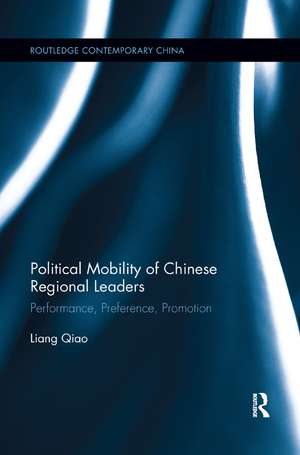Political Mobility of Chinese Regional Leaders: Performance, Preference, Promotion: Routledge Contemporary China Series
Autor Liang Qiaoen Limba Engleză Paperback – 23 ian 2019
Today’s regional leaders of China will very likely become the central leaders of China in the future. By making an empirical analysis of Chinese regional leaders’ political mobility, Qiao establishes a descriptive political mobility model that reveals leadership trajectories in Chinese politics.
| Toate formatele și edițiile | Preț | Express |
|---|---|---|
| Paperback (1) | 416.22 lei 6-8 săpt. | |
| Taylor & Francis – 23 ian 2019 | 416.22 lei 6-8 săpt. | |
| Hardback (1) | 1000.27 lei 6-8 săpt. | |
| Taylor & Francis – 26 iun 2017 | 1000.27 lei 6-8 săpt. |
Din seria Routledge Contemporary China Series
-
 Preț: 326.21 lei
Preț: 326.21 lei -
 Preț: 339.65 lei
Preț: 339.65 lei -
 Preț: 311.41 lei
Preț: 311.41 lei -
 Preț: 280.32 lei
Preț: 280.32 lei -
 Preț: 317.85 lei
Preț: 317.85 lei -
 Preț: 350.12 lei
Preț: 350.12 lei - 18%
 Preț: 1059.45 lei
Preț: 1059.45 lei - 28%
 Preț: 848.57 lei
Preț: 848.57 lei - 18%
 Preț: 1223.21 lei
Preț: 1223.21 lei - 18%
 Preț: 1060.74 lei
Preț: 1060.74 lei -
 Preț: 422.90 lei
Preț: 422.90 lei - 18%
 Preț: 954.20 lei
Preț: 954.20 lei - 18%
 Preț: 1169.66 lei
Preț: 1169.66 lei - 18%
 Preț: 1049.84 lei
Preț: 1049.84 lei - 18%
 Preț: 1217.95 lei
Preț: 1217.95 lei - 18%
 Preț: 1222.16 lei
Preț: 1222.16 lei - 28%
 Preț: 823.99 lei
Preț: 823.99 lei - 18%
 Preț: 1061.93 lei
Preț: 1061.93 lei - 18%
 Preț: 1057.89 lei
Preț: 1057.89 lei - 18%
 Preț: 1112.03 lei
Preț: 1112.03 lei - 18%
 Preț: 1008.02 lei
Preț: 1008.02 lei -
 Preț: 416.82 lei
Preț: 416.82 lei - 25%
 Preț: 823.99 lei
Preț: 823.99 lei - 18%
 Preț: 1114.70 lei
Preț: 1114.70 lei - 15%
 Preț: 702.39 lei
Preț: 702.39 lei - 28%
 Preț: 526.88 lei
Preț: 526.88 lei - 18%
 Preț: 712.13 lei
Preț: 712.13 lei - 18%
 Preț: 1065.06 lei
Preț: 1065.06 lei - 18%
 Preț: 703.09 lei
Preț: 703.09 lei - 18%
 Preț: 1060.87 lei
Preț: 1060.87 lei - 18%
 Preț: 1057.89 lei
Preț: 1057.89 lei - 18%
 Preț: 1062.98 lei
Preț: 1062.98 lei - 18%
 Preț: 1222.16 lei
Preț: 1222.16 lei - 18%
 Preț: 1055.51 lei
Preț: 1055.51 lei -
 Preț: 413.55 lei
Preț: 413.55 lei - 18%
 Preț: 1001.84 lei
Preț: 1001.84 lei -
 Preț: 386.57 lei
Preț: 386.57 lei - 18%
 Preț: 1055.38 lei
Preț: 1055.38 lei - 18%
 Preț: 1053.95 lei
Preț: 1053.95 lei - 18%
 Preț: 1061.57 lei
Preț: 1061.57 lei - 18%
 Preț: 1058.79 lei
Preț: 1058.79 lei - 18%
 Preț: 1109.18 lei
Preț: 1109.18 lei - 18%
 Preț: 1053.47 lei
Preț: 1053.47 lei - 18%
 Preț: 1053.16 lei
Preț: 1053.16 lei - 18%
 Preț: 728.24 lei
Preț: 728.24 lei - 18%
 Preț: 1055.38 lei
Preț: 1055.38 lei - 18%
 Preț: 1165.87 lei
Preț: 1165.87 lei - 18%
 Preț: 1227.38 lei
Preț: 1227.38 lei - 15%
 Preț: 701.45 lei
Preț: 701.45 lei
Preț: 416.22 lei
Nou
Puncte Express: 624
Preț estimativ în valută:
79.67€ • 86.57$ • 66.97£
79.67€ • 86.57$ • 66.97£
Carte tipărită la comandă
Livrare economică 22 aprilie-06 mai
Preluare comenzi: 021 569.72.76
Specificații
ISBN-13: 9780367141981
ISBN-10: 0367141981
Pagini: 186
Ilustrații: 18
Dimensiuni: 156 x 234 x 11 mm
Greutate: 0.45 kg
Ediția:1
Editura: Taylor & Francis
Colecția Routledge
Seria Routledge Contemporary China Series
Locul publicării:Oxford, United Kingdom
ISBN-10: 0367141981
Pagini: 186
Ilustrații: 18
Dimensiuni: 156 x 234 x 11 mm
Greutate: 0.45 kg
Ediția:1
Editura: Taylor & Francis
Colecția Routledge
Seria Routledge Contemporary China Series
Locul publicării:Oxford, United Kingdom
Public țintă
Postgraduate and UndergraduateCuprins
ACKNOWLEDGEMENTS
LIST OF TABLES
LIST OF FIGURES
ABSTRACT
INTRODUCTION
CHAPTER TWO: THE CHINESE REGIONAL LEADERS: WHO ARE THEY?
CHAPTER THREE: THE RECRUITMENT AND POLITICAL MOBILITY OF CHINESE REGIONAL LEADERS
CHAPTER FOUR: REGIONAL LEADERSHIP SELECTIONS IN CONTEMPORARY CHINA: QULIFICATIONS AND PREFERENCES
CHAPTER FIVE: FISCAL REVENUES, GEOPOLITICAL SETTINGS AND POLITICAL MOBILITY OF CHINESE REGIONAL LEADERS
CHAPTER SIX: FOR THE HARMONIOUS SOCIETY: DOWNGRADED AND DEMOTED REGIONAL LEADERS
CONCLUSIONS
SELECTED BIBLIOGRAPHY
LIST OF TABLES
LIST OF FIGURES
ABSTRACT
INTRODUCTION
CHAPTER TWO: THE CHINESE REGIONAL LEADERS: WHO ARE THEY?
CHAPTER THREE: THE RECRUITMENT AND POLITICAL MOBILITY OF CHINESE REGIONAL LEADERS
CHAPTER FOUR: REGIONAL LEADERSHIP SELECTIONS IN CONTEMPORARY CHINA: QULIFICATIONS AND PREFERENCES
CHAPTER FIVE: FISCAL REVENUES, GEOPOLITICAL SETTINGS AND POLITICAL MOBILITY OF CHINESE REGIONAL LEADERS
CHAPTER SIX: FOR THE HARMONIOUS SOCIETY: DOWNGRADED AND DEMOTED REGIONAL LEADERS
CONCLUSIONS
SELECTED BIBLIOGRAPHY
Notă biografică
Liang Qiao is Assistant Professor of Political Science, Renmin University of China in Beijing
Descriere
A monarch is usually born, a member of parliament or a president is usually elected, but a regional leader in China is usually orchestrated to replace his or her predecessor through an opaque process and for reasons not normally made public. The professional trajectories of Chinese regional leaders are mysterious in many ways. Their promotions and demotions can be "predictable" in terms of their age, gender, nationality, education, factions, and previous engagements in the political system. Yet, speaking of their capability, performance, opportunities and arrangements, their future can also be "unexpected". Such arrangements are always originated from the Organization (zuzhi) which represents the Chinese Communist Party. What are the factors the organization considers in order to make its final decisions on nominating and appointing a regional leader?
